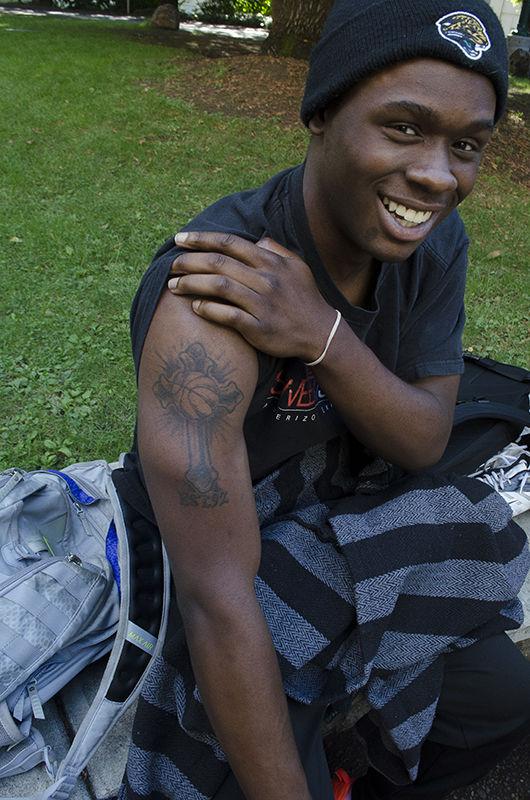Students take permanent measures for art
Anthony Williamson Senior Kinesiology Major “Its basically a cross with a basketball so it centers around two of my main morals in my life – basketball and God. So that’s kind of where it came from. My mom was just like ‘keep your morals in tack, keep your priorities straight.’ You always go with God first, then family and basketball.”
October 1, 2014
Most students know someone who has a tattoo — if they do not have one themselves. Despite becoming increasingly popular in the younger demographic, there are still some negative connotations that go hand-in-hand with body art.
People get tattoos for many reasons, some have significant meanings, some are works of art while others are just spur of the moment souvenirs of an interesting time in a person’s life.
As students at Sacramento State work toward their degrees and careers, they also may be getting tattoos. Yet employers still hold some strict policies on body art, so making the right tattoo choice is very important.
Robert Jordan is a 23-year-old tattoo artist at Wild Bill’s Tattoo in Roseville.
Jordan comes from a long line of tattoo artists, dating back to his grandfather who was tattooed in the Navy who then became a tattoo artist after being discharged.
He started tattooing when he was just 13-years-old; he started by practicing on his own body and then began tattooing his friends. He has been working professionally in a tattoo shop since he was 17.
Jordan also founded a company called Know Your Craft Tattoo Machines in which he hand makes tattoo machines and sells them worldwide.
Throughout his career in the tattoo business, Jordan has gained some perspective on the taboos associated with tattooing.
“Tattooing has lost its meaning,” Jordan said. “It’s becoming more of a fashion statement.”
He encourages people not to get tattoos to impress other people or fit a certain look.
“Everyone has the right to get tattoos, but a lot of people don’t understand the consequences of them,” he said. “Our generation is very impatient, and they don’t think about how this tattoo will affect them later in life.”
Jordan suggests before committing to getting a tattoo a person should look at their “five year plan.”
“Can you picture yourself with that tattoo in five years?” asks Jordan. “Can you picture yourself in the career you want with that tattoo? If not, don’t get it.”
It is very common that people have tattoos, but most professional people have them in places they can cover up.
Jordan said he has tattooed doctors, lawyers, cops and judges, but what they all have in common is that the tattoos are not be visible in the workplace.
“Young people are influenced by rappers and football players who are successful and heavily tattooed, but what they don’t see past is the fact that they’re already in a career, and their career doesn’t care if they have tattoos,” Jordan said.
Many employers have dress codes that state tattoos must be covered. Employers stress the fact that presentation and knowing the target market is important.
Jaime Gerigk, a volunteer coordinator for Bristol Hospice, said a lot of young volunteers are tattooed, but they are not visible during work.
“People have to recognize that we usually work with the elderly, and they are less accepting of body art,” Gerigk said. “You have to take into account your potential career before getting tattooed.”
The places where tattoos are most taboo are the hands, neck and face.
There is a strong correlation with tattoos in those areas and negative behavior such as gang activity; 30 or 40 years ago, the only two groups of people who had tattoos were sailors and convicts.
Think about placement and content when deciding to get a tattoo, said Jordan.
It is also important to research the shop to make sure they are credible artists.
“Popularity of tattoos has led to a million and one tattoo shops but not all of them know what they’re doing, and not all of them respect the future of the customer,” Jordan said.
The California Health Board regulations states a tattoo artist may not tattoo a person who is under the influence, but many shops do not enforce this rule. Because of this many people get tattoos that they will regret.
“I refuse to tattoo hands, necks, faces or names because I just don’t think in the long run they will want that tattoo forever. We do cover-ups almost every day,” said Jordan.
Maggie Liss, a 21-year-old criminal justice major said she has a couple tattoos and thinks tattoos in the workplace should be more acceptable.
“I absolutely love my tattoos. The one on my back means a lot to me personally; it’s about being independent and knowing that in the end I can make things happen,” Liss said. “My other is an autism ribbon with puzzle pieces for my two brothers who are severely autistic. I did not get my tattoos to impress others.”
Many tattoos have positive messages or meanings yet people are unable to display them at work.
“They are pieces of amazing art that mean something, and I believe that with our generation, tattoos are becoming increasingly popular and more socially acceptable,” Liss said. “I have been discriminated in the workplace by not being able to show my tattoos. I believe as long as they are nice and do not stand for anything bad, then people should be allowed to show their art at work.”
Though tattoos are becoming increasingly popular, our generation is still making its way into the workforce.
It’s important to remember tattoos are there forever, and they can have a huge impact on a persons’ future.
After all, Jordan said, “Tattoo machines don’t have an eraser on the other end of them.”























































































































